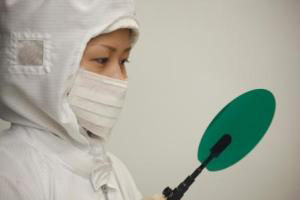Showa Denko (SDK) is launching silicon carbide (SiC) epitaxial wafers with a diameter of 6 inches (150mm) - the largest size currently available, it is claimed - for use in power devices. The firm is also selling a new grade of 4-inch (100mm) SiC epiwafers with fewer defects and higher uniformity.

Picture: SDK’s new 6” SiC epiwafers.
Up to now, SDK has been producing and selling 3-inch (76.2mm) and 4-inch SiC epiwafers. In addition, SDK has worked to develop the next-generation 6-inch SiC epiwafers (which should lead to increased productivity), providing samples since the beginning of this year. As the volume production technology has now been established and product specifications have been prepared, the firm has decided to begin commercial shipments as from October.
Compared with mainstream silicon-based semiconductors, SiC power devices using SiC epiwafers can operate under high-temperature, high-voltage and heavy-current conditions while substantially reducing energy loss, enabling the production of smaller, lighter and more efficient power control modules. SiC power devices are therefore expected to be in high demand for use in inverters (converting direct current into alternating current) for automobiles, railcars and industrial/home electric appliances.
Inverters based on SiC power devices are already used in applications such as power sources of servers for data centers, distributed power supply systems for new energy sources, and subway railcars. The new 6-inch SiC epiwafers can help to reduce power-device production costs and to promote volume production of SiC power devices with current-carrying capacity of as much as 100A, reckons SDK. SiC-power-device-based inverters are hence expected to be increasingly used in electric vehicles and hybrid cars.
Following the expansion of its product lines, SDK says that it will continue to improve product quality and increase production capacity. SDK is planning to increase its SiC epiwafer production capacity from 1500 units per month (in terms of 4-inch wafers) currently to 2500 units per month by mid-2014.





